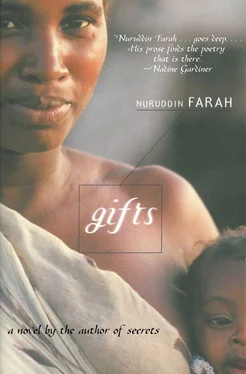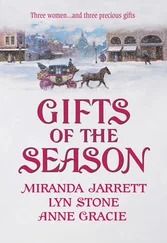Nuruddin Farah - Gifts
Здесь есть возможность читать онлайн «Nuruddin Farah - Gifts» весь текст электронной книги совершенно бесплатно (целиком полную версию без сокращений). В некоторых случаях можно слушать аудио, скачать через торрент в формате fb2 и присутствует краткое содержание. Год выпуска: 2011, Издательство: Arcade Publishing, Жанр: Современная проза, на английском языке. Описание произведения, (предисловие) а так же отзывы посетителей доступны на портале библиотеки ЛибКат.
- Название:Gifts
- Автор:
- Издательство:Arcade Publishing
- Жанр:
- Год:2011
- ISBN:нет данных
- Рейтинг книги:3 / 5. Голосов: 1
-
Избранное:Добавить в избранное
- Отзывы:
-
Ваша оценка:
- 60
- 1
- 2
- 3
- 4
- 5
Gifts: краткое содержание, описание и аннотация
Предлагаем к чтению аннотацию, описание, краткое содержание или предисловие (зависит от того, что написал сам автор книги «Gifts»). Если вы не нашли необходимую информацию о книге — напишите в комментариях, мы постараемся отыскать её.
Gifts — читать онлайн бесплатно полную книгу (весь текст) целиком
Ниже представлен текст книги, разбитый по страницам. Система сохранения места последней прочитанной страницы, позволяет с удобством читать онлайн бесплатно книгу «Gifts», без необходимости каждый раз заново искать на чём Вы остановились. Поставьте закладку, и сможете в любой момент перейти на страницу, на которой закончили чтение.
Интервал:
Закладка:
Somebody prayed, O God, let Bosaaso come! Then they heard panning feet, light as raindrops on zinc-sheeting. Nasiiba said, “Here he is, in plimsolls, jogging,” and they all waited. When he came in, they felt like soldiers who were relieved to learn they were among friends at last. They welcomed Bosaaso and started to tell him in whispers everything that had passed. He looked in Duniya’s direction like someone waylaid by bandits, but he remained with the children. Nasiiba urged Mataan to tell them a Juxaa-story. Both Yarey and Bosaaso encouraged him too, with Nasiiba adding that Duniya would also love to hear one.
A hunter who was an acquaintance of Juxaa’s one day brought him a pheasant as a present, which Juxaa’s wife prepared for the two men. A couple of months later a man unknown either to Juxaa or his wife knocked on their door. “Who are you?” they asked the man.
“I am a friend of your acquaintance, the hunter,” the man introduced himself, “who gave you a pheasant as a present which your wife prepared and on whose meat the three of you feasted.”
Juxaa and his wife welcomed the man in and they fed him generously The visitor left, promising to let the hunter know that a feast had been given him in his honour.
A few weeks went by and another man knocked on Juxaa’s door. To the question “Who are you?” the man responded that he was a neighbour of the friend to Juxaa’s acquaintance, the hunter, who had brought them a pheasant as a gift, upon which they had all feasted.
“Welcome,” said Juxaa to the man, letting him in.
Half an hour later Juxaa placed before the man a very large cauldron, with the lid still on. When the man removed the cover, he discovered to his surprise that there was nothing in the large pot, except water, turning and boiling hot. “What’s the meaning of this?” inquired the caller.
Juxaa said, “The bubbling water before you has been boiled in the very cauldron as the pheasant that my acquaintance, the hunter, has presented us with; what is more the cauldron is the same pot in which your friend’s food has been cooked. Welcome. Eat.”
Saying nothing, the man left Juxaa’s house.
Half an hour later, Duniya sat alone in the armchair where they had left her. A voice was urging her to get up, go to the foundling’s cot and find out why it hadn’t stirred for so long. But another voice, equally convincing, was encouraging her to concentrate on the handsomeness of an eagle flying high in the heavens and refusing to land anywhere. And this second dreamy voice said, “The foundling has done whatever it came into this life to achieve. It arrived unheralded and will probably leave unannounced. A mythical child, if you like,” the voice went on. It did not sound at all like Bosaaso, more like Nasiiba. “A baby whose beginning shared the timelessness of fables, expiring in the inexactness of legends. Think of Moses in a bullrush basket floating down a river, think of miracle babies, think of myths,” the voice concluded.
But I want to get up! Duniya said to herself, although she hadn’t the urge within her to stand up. It was as if a weight heavier than she was holding her down, forbidding her to rise.
Then a dragon-fly alighted on the tip of her nose.
But Duniya was too sleepy to chase the dragon-fly away She thought she heard a knock on the outside door, and maybe someone stumbling in. Or was that the noise of the foundling moving in its cot? Duniya saw an eagle descend, watched it enter the baby’s room, saw it emerge, holding clasped in its beak as it flew out towards the heavens not a baby but a dragon-fly.
Everything was so dreamy and still, Duniya thought she too was not among the living.
11
In which Taariq and Qaasim call on Duniya. Mire comes to call later in the afternoon.
Duniya woke up to a cabalistic quietness in which she was not sure if she imagined Taariq’s voice asking if she would like a cup of tea. But what about the foundling? And where was Taariq? For a sleepy instant, everything was real as a dream being dreamt.
Noises came from the kitchen: a kettle being rinsed, then filled with tap water; matches being struck, gas flames smelling blue and nauseating. Someone was pacing up and down, whistling. These hints strengthened her suspicion that Taariq had come, that it was his voice she had heard. She arched her back, her neck a little stiff. She had fallen asleep in an armchair just outside Mataan’s room, as if guarding his door. She had his bicycle-chain in one hand and the dress Nasiiba had given her in the tight grip of the other. She must have fallen into the shallow well of siesta just as Bosaaso and the others left. Again, the question: what about the baby?
She would ask Taariq to take a look, she thought drowsily.
He had visibly aged since she last set eyes on him, only God knew how long ago. Now he looked like a man at peace with himself. A mutual friend by the name of Cige, himself an excellent journalist, one of Somalia’s best, had once said to Duniya, “No sight is uglier than a journalist not writing any more. All that unemployed energy is so sad. It’s like a river running to sand, wasting itself.” Cige and Taariq and Duniya had been standing in front of the government printing press where the country’s only daily newspaper, Xiddigta Oktooher, was printed. Duniya had gone to seek Taariq’s assurances that Yarey would not be made to undergo the torture of infibulation. Both Qaasim and Muraayo had given their word, but Duniya wanted to be absolutely certain. Only that morning Hibo had brought to the hospital her youngest daughter who had been circumcised without her knowledge by her visiting mother-in-law, Gallayr’s mother. To set Duniya’s mind at rest, Taariq pointed out that Muraayo had not herself suffered such an amputation. Her worries allayed, she accepted that Yarey stay on in Uncle Qaasim’s and Muraayo’s household.
At last the meaning of the noise became clear, as Taariq arrived carrying a tray of tea and a jug of cold water from the clay water-pot. Awake, Duniya saw him hesitate, wondering where to place the tray. Suddenly she lumbered to her feet, Ml of energy. This filled him with vitality too. Duniya took in all that met her eyes, noting the state of disrepair the house was in — was it appropriate that she quit without giving consideration to that? Nothing to regret, she told herself, no sins to repent. The floors would be whitewashed, the walls too; all would be well.
He had found a low table for the tray, and said, “Where has everyone gone? Where are the children?”
Marriage is one way of forming ugly or good habits. Taariq knew her preferences; he knew how she liked her tea, how much sugar she took, that she seldom drank it with milk. She also noticed he had brought her a jugful of water so she could get rid of the taste of sleep. He poured out two cups of tea.
She took a mouthful of water, gargled, then spat. She wasn’t sure if it was sleep or blood that she tasted in her saliva as she gargled. She rinsed her face with the cold water, then sat down. No formalities between them. On second thoughts, she wished she had done all this gargling and face-washing in the privacy of her bathroom. She felt self-conscious suddenly, as though her behaviour was something picked up from constant association of late with Bosaaso.
“The girls have gone to a film, I don’t know where,” she said.
“Do you know what they’ve gone to see?”
“Nosferatu. I think that’s what Nasiiba said.”
“Not Profumo di Donna?”
Duniya pondered. She remembered seeing and liking it in Rome in the original, with Abshir. She was sure the girls had not gone to watch Profumo di Donna at a friend’s. But they were civil with each other even in their disagreements, not tearing into each other out of a sheer desire to pick faults, as they had done the last seven months of their marriage. He took a sip of his tea.
Читать дальшеИнтервал:
Закладка:
Похожие книги на «Gifts»
Представляем Вашему вниманию похожие книги на «Gifts» списком для выбора. Мы отобрали схожую по названию и смыслу литературу в надежде предоставить читателям больше вариантов отыскать новые, интересные, ещё непрочитанные произведения.
Обсуждение, отзывы о книге «Gifts» и просто собственные мнения читателей. Оставьте ваши комментарии, напишите, что Вы думаете о произведении, его смысле или главных героях. Укажите что конкретно понравилось, а что нет, и почему Вы так считаете.











